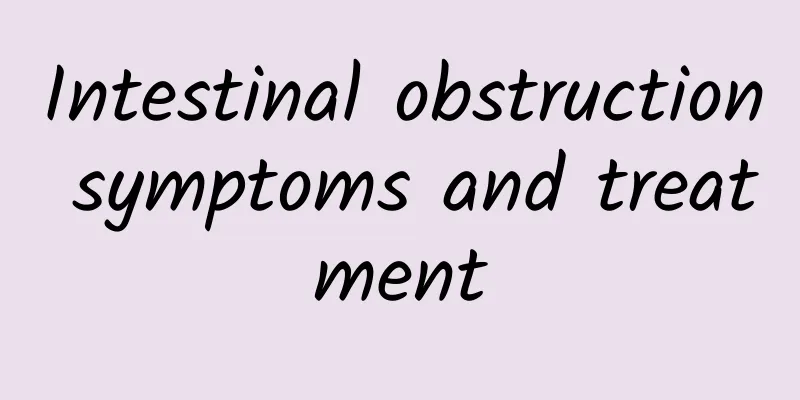Intestinal obstruction symptoms and treatment

|
The human body relies on the digestive system to digest the food it eats, and the gastrointestinal function is to absorb the nutrients needed for rest during digestion. Therefore, we can see the importance of gastrointestinal health. Intestinal obstruction is a serious threat to gastrointestinal health, because intestinal obstruction refers to the obstruction of the intestinal contents in the intestine, which causes abdominal cramps, vomiting, bloating, anal gas and defecation, etc. So what are the symptoms of intestinal obstruction and how should it be treated? Let's find out together below. 1. Symptoms of intestinal obstruction: 1. Abdominal pain Most patients with intestinal obstruction have abdominal pain as the main and initial symptom. In patients with acute complete mechanical small bowel obstruction, abdominal pain manifests as paroxysmal colic, which is caused by strong peristalsis of the intestine above the obstruction site. It is mostly located in the middle of the abdomen, often occurs suddenly, gradually intensifies to a peak, lasts for a few minutes and then eases. The interval can be completely painless, but it may recur after a period of time. 2. Vomiting Almost all patients with intestinal obstruction vomit. In the early stage, it is reflex vomiting, and the vomiting is mostly gastric contents. In the later stage, it is reflux vomiting, which varies depending on the location of the obstruction. The higher the location, the more frequent and severe the vomiting. 3. Abdominal distension It is a symptom that appears later, and its severity is related to the site of obstruction. High small intestinal obstruction often does not cause obvious abdominal distension due to frequent vomiting; low small intestinal obstruction or colon obstruction in the late stage often causes significant abdominal distension. 4. Stop defecation and gas discharge from the anus In complete intestinal obstruction, the patient will no longer have bowel movements or pass flatus. 5. Systemic symptoms Patients with simple intestinal obstruction generally have no obvious systemic symptoms, but those with frequent vomiting and severe abdominal distension may be dehydrated, and those with low blood potassium and blood sodium may have symptoms such as fatigue, drowsiness, weakness and arrhythmia. Patients with strangulated intestinal obstruction have the most significant systemic symptoms. They suffer from dehydration in the early stages and quickly go into a state of shock. 2. Treatment of intestinal obstruction: 1. Correct dehydration, electrolyte loss and acid-base imbalance. 2. Gastrointestinal decompression Decompression through gastrointestinal intubation can lead out swallowed gas and retained fluid, relieve intestinal distension, avoid aspiration pneumonia, relieve vomiting, improve circulation and respiratory distress symptoms caused by abdominal distension, and to a certain extent improve congestion, edema and blood circulation in the intestine above the obstruction. 3. Control infection and sepsis When intestinal obstruction lasts too long or strangulation occurs, due to bacterial translocation, the blood, intestinal wall and peritoneum are often infected with multiple bacteria. It is very important to actively use broad-spectrum antibiotic intravenous drip treatment with a focus on Gram-negative bacteria and anaerobic bacteria. 4. Relieve obstruction and restore intestinal function Non-surgical treatment can be used for general simple mechanical intestinal obstruction, especially early incomplete intestinal obstruction, such as intestinal obstruction caused by ascaris, fecal blockage or inflammatory adhesion. |
Recommend
Can I eat ginseng during breastfeeding?
During breastfeeding, you cannot eat based solely...
How many degrees is considered a fever
The human body is so amazing. Under normal circum...
How to get rid of chicken skin on thighs
Chicken skin is a kind of red protrusion on the s...
Stop toothache in one minute
We know that a cold and fever will take two or th...
What happens if you ejaculate every day?
Ejaculating every day is excessive indulgence, wh...
Does chiropractic really work?
We usually think that spinal curvature is only ca...
Want to nourish your stomach and repair your gastric mucosa? You have to eat this to work
Excessive pressure in life and too busy work lead...
What to do if the elderly have auditory hallucinations
If the elderly experience auditory and visual hal...
Narrowing of the lumbar foramen
Causes of lumbar foraminal narrowing In fact, the...
What are the benefits of anti-slip pads for glasses
In life, for people who wear glasses, they may we...
What to do if your plantar muscles hurt
Since the soles of the feet are the area that sup...
How long does it take for a crooked mouth to recover after tooth extraction and anesthesia?
Anesthesia is required when extracting teeth. For...
Slight body tremors
If there is a slight tremor in the body, there ar...
Can people with stomach problems eat pumpkin?
Various varieties of pumpkins can be seen everywh...
A few common senses you must know about Xiu Ren Shu Ran
There is a plant called yam. Anyone who has seen ...









